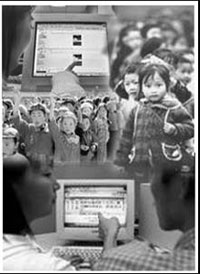The gift of warmth for students
Updated: 2007-12-20 07:24
Among the candidates for the most popular Chinese of the year on the Internet is Mao Lihui, a primary school teacher at a small mountain village in Zhaotong city, Yunnan Province.

He caught the attention of Chinese netizens after he posted photos of his students on a website last December. He wasn't sure what else he could do when he found his students didn't have enough padded coats and warm shoes to ward off the sudden cold front and snow.
They were shivering in class. In between classes, they huddled together, their laughter gone.
He said he posted the photos in the hope that he could at least secure some warm shoes for his students.
That's when, to his surprise, parcels containing clothes and toys started to arrive at the town's post office. On some days, postal workers had to pile these packages on the roof as well as in the yard.
Because there is still no paved road linking village and town, Mao has to carry the donated goods on his back. The walk is three hours one way.
In the year since he posted the pictures, Mao has received some 30,000 packages.
This story is a reflection of how powerful the Internet can be when it comes to mobilizing help for people like Mao's students. It also demonstrates the generosity of Chinese people when it comes to helping those in need.
The part of the story that moved me most was that Mao and his students do not take these donations for granted. Since his students could not have used the many goods that were sent, they spread them among students in nearby towns.
Bringing five of his students to Beijing this week, Mao said he wanted to help them express their gratitude to everyone who had lent them a helping hand.
But I believe most of the people who sent things did so out of kindness, with no ulterior motives. Mao has said that only about a third of the people gave their real names and addresses, with most senders identifying themselves simply as "a group of people who love you", "an uncle", "your brother" or "a Chinese from Earth".

In fact, we should also be thanking Mao for making many urban children aware that they have peers living in remote mountainous regions who have overcome extreme adversity to pursue their studies.
There are still questions that remain unanswered. For example, is there any way to remodel remote classrooms to include a stove to provide heating?
I still remember visiting a country school in Iowa, in the United States, that had been built in the middle of the 19th century. To me, the classroom's most impressive feature was the big stove.
I know the mountainous area where Mao teaches may not have coal, nor would they be able to burn a lot of wood.
Meanwhile, we should also be asking how many more children in remote mountainous areas across the country continue to attend classes in rundown schools, shivering from the cold.
Local governments and education administrations are responsible for ensuring that children are able to go to school in their jurisdiction without fear of chills or cold.
E-mail: lixing@chinadaily.com.cn
(China Daily 12/20/2007 page10)
|
|
|
|
|
|